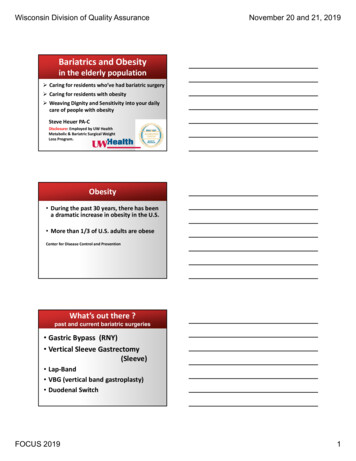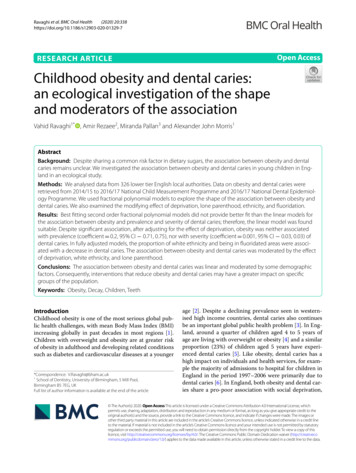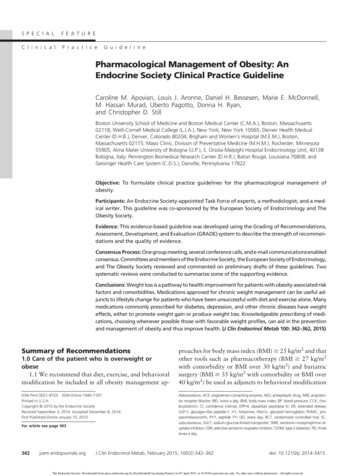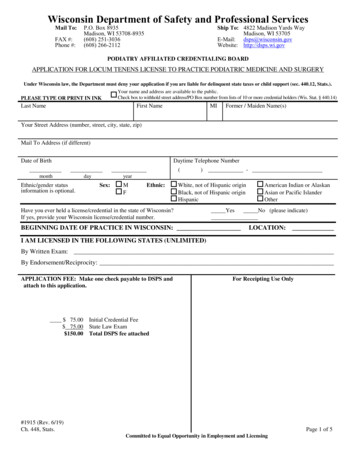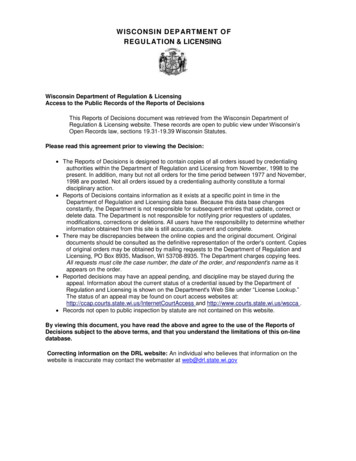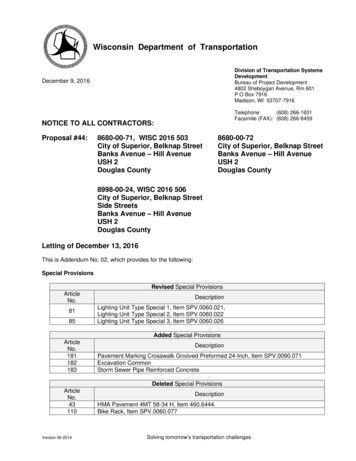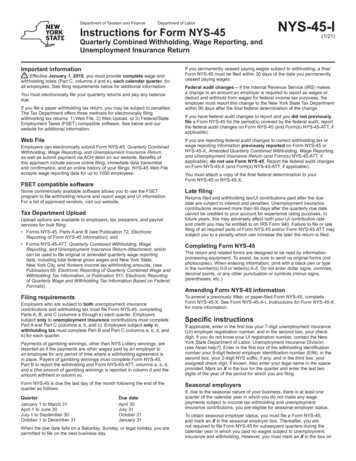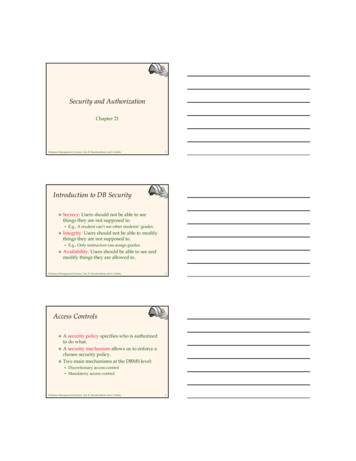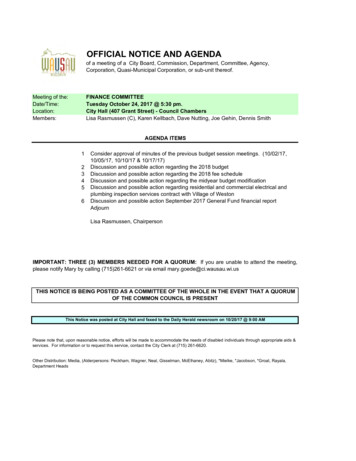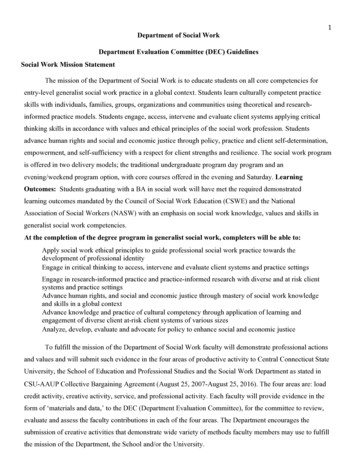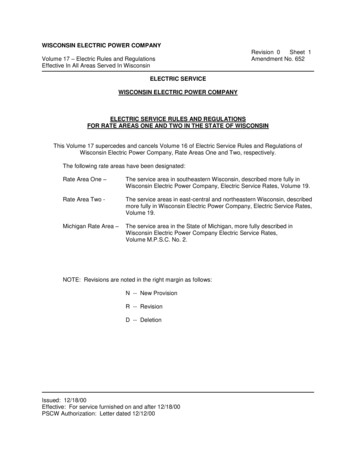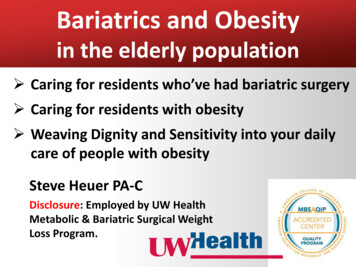
Transcription
Bariatrics and Obesityin the elderly population Caring for residents who’ve had bariatric surgery Caring for residents with obesity Weaving Dignity and Sensitivity into your dailycare of people with obesitySteve Heuer PA-CDisclosure: Employed by UW HealthMetabolic & Bariatric Surgical WeightLoss Program.
Obesity During the past 30 years, there has beena dramatic increase in obesity in the U.S. More than 1/3 of U.S. adults are obeseCenter for Disease Control and Prevention
What’s out there ?past and current bariatric surgeries Gastric Bypass (RNY) Vertical Sleeve Gastrectomy(Sleeve) Lap-Band VBG (vertical band gastroplasty) Duodenal Switch
Gastric BypassRestrictive (small pouch size)Malabsorptive(skips part of the intestine)Alters hunger hormones& insulin sensitivity little to no hunger much improved diabetesThe most common bariatric surgery until recently
Vertical Sleeve GastrectomyRestrictive (small pouch size)To a lesser degree:alters hunger hormones The most popular bariatric surgery today
Lap-Bandsmall pouch size, a speed bumpPROBLEMS Does not reduce hunger Does not insulin sensitivity Restriction can be quite variable If too tight or not following eating rules– Pain– Reflux (GERD)– Esophageal dysmotility and deformity Band volume reduction (unfill)loss of restriction on-off switch Band can slip (up or down)On Upper GI (band appears horizontal) Band can erode into the stomach
VBGVertical Band GastroplastySimilar to the lap-bandRestrictivePROBLEMS(small pouch size)A speed bump Hunger unchanged Insulin sensitivity unchanged Stenosis (scaring)– Too tight leads to very poor nutrition– UGI shows very slow transit of contrastNo longer performed.More popular 20 yearsago.
Duodenal Switch Restrictive (small pouch size) Malabsorptiveskips large portion of small intestine Alters hunger hormonesand insulin sensitivity little to no hunger much improved diabetesPROBLEMPoor nutrient absorptionMALNUTRITIONKeep a closer eye on these patients Check nutritional labs more often Supplement compliance is crucial Far less common these days
Why surgery ?Improved Co-morbid Conditions Type 2 DiabetesObstructive sleep apneaHigh cholesterolHypertensionHeart DiseaseGERD (reflux/heart burn)GallstonesDegenerative joint diseaseFatty liver diseaseAsthmaStress incontinenceBirth defectsMiscarriagesInfertility Cancer– Breast– Cervical– Endometrial– Ovarian– Colorectal– Liver– Pancreatic– Esophageal– Lung– Prostate– Kidney– Lymphoma– Multiple myeloma– Leukemia
The end-gameis not a number Improved Quality of Life Longer LifeA “normal” BMI is not necessary toachieve profound health benefits andimproved quality of life.
Eating Rules (habits)Support & reinforce eating rules and habits Eat slowly (w/o distractions) Keep portions small– One bite can be all it takes to be too much Chew Chew Chew– When in doubt spit it outWHY? Stomach is now:– much smaller– not stretchable– no longer able to chew food (if your mouth didn’t)
Eating Rules (habits)Don’t drink with mealsor immediately after eatingCheat #1WHY? It can flush the pouch making it easier tocontinue eating/grazing It robs you of satiety (sense of fullness) It can be too much volume for your stomach,triggering pain and vomiting.Best to wait 30-60 minutes
Eating Rules (habits)AVOID or limit:–Calorie dense foods (high-cal, low-nutrient)–Carbonated beverages–Sweets (natural sugars)–Alcohol
Eating Rules (habits)AVOID or limit:–Calorie dense foods (high-cal, low-nutrient)–Carbonated beverages–Sweets (natural sugars)–AlcoholPromotes cravings and is an easy way toCheat #2get in more calories than needed, leadingto weight regain.
Eating Rules (habits)AVOID or limit:–Calorie dense foods (high-cal, low-nutrient)–Carbonated beverages–Sweets (natural sugars)–AlcoholBubbles can stretch the pouch. This canbe painful, might aggravate GERD or(over time) enlarge the pouch.
Eating Rules (habits)AVOID or limit:–Calorie dense foods (high-cal, low-nutrient)–Carbonated beverages–Sweets (natural sugars)–AlcoholToo much sugar (any naturalsweetener) and sometimes reallyfatty foods can trigger a dumpingepisode.
Dumping SyndromeSymptoms ( patient may experience some or all )Flushed feelingLightheadedRacing heart (tachycardia)Sudden and profound fatigueNausea (mild to profound)Belly discomfortVomitingDiarrhea
Dumping Syndrome Dose-dependant 5 grams of sugar Sx present 2-20 minutes after consumingthe triggering food or drink Seen in 50% of RNY patients Unpredictable OTC cold, flu remedies often contain naturalsweeteners and alcohol
Eating Rules (habits)AVOID or limit:–Calorie dense foods (high-cal, low-nutrient)–Carbonated beverages–Sweets (natural sugars)–Alcohol
AlcoholAlcohol absorbs more completely and lightning fastleading to more rapid, intense, and lasting inebriation withfar less alcohol than prior to surgery. Weight regainRapid intoxication DWIToxicity (liver)Transfer of addiction
Nutrition considerations( eating rules part 2) Water (nutrient #1) Macronutrients Protein Micro-nutrients Fats (oils) Carbs Vitamins Calcium other minerals Iron
WATERand other fluidsWater water waterWe all should be drinking enough water to have to urinate every2-3 hours during the day.CHALLENGE: don’t flush your pouchWait 45-90 minutes after a meal before returning to fluidsSweet drinks and bubblesBubbles can be painful (some have difficulty belching)Sweet drinks promote obesity and may trigger a dumpingepisode.Alcohol absorbs very rapidly and more completelyEasy to get drunk or toxicLiquid OTC preparations may have sugar /or alcohol.
Macro-nutrients (all of us)PROTEIN Protein first and at every meal Helps with satiety Helps with sustained energy 60g-100g/day Less processed meats Brats Dogs Case meats/cold-cuts (varies)
Macro-nutrients (all of us)FATS Eat some fat at every meal Avoid processed fats Shelf-foods often contain processed (trans) fatsfor shelf-life. If it doesn’t rot it’s not food Better oils are: Extra virgin Olive Avocado Coconut
Macro-nutrients (all of us)CARBS Complex/slow carbs are the best Minimize simple/fast carbs Sweets sweet drinks– including juice Flour-based es
Micro-nutrientsVitamins Mulit-vit complete (chewable) B-complex (B-50) Make sure it contains at least 50mg thiamine B-3 (niacin) in higher doses triggers red-face and flushed feeling. B-12 sublingual 500-1000mcg WHY SL? With a smaller stomach there is much less intrinsicfactor (necessary for B-12 absorption from the gut). D-3 5000 iu/day (check)
Micro-nutrients Calcium Calcium citrate (Citrucel) Take 2-3 x/day (to a total of 1200-1600mg/d)CHALLENGE: not close to when taking iron. Iron ferrous sulfate does not absorb as well, is morelikely to cause GI upset Ferrous Gluconate 325mg Take with vit C and not close to when taking calcium
TESTING for microsROUTINE SCREEN B-1 (Niacin)B-12CalciumPTHVit D-25CBC Iron TIBC Ferritin Vit DMANY OTHERS B-6Vit-AVit EVit KSeleniumZincCopperetc .
Vitamin D is often low ( 30)TREATMENT IF D is 15-25 Ergocalciferol 50,000 IU 3 times weekly for 4 weeks AND OTC D-3 5000 iu daily THEN Ergocalciferol 50,000 IU weekly (ongoing) IF D is 1-14 Ergocalciferol 50,000 IU 3 times weekly for 8 weeks AND OTC D-3 5000 iu daily THEN Ergocalciferol 50,000 IU weekly (ongoing) IF D is 25-35 Ergocalciferol 50,000 IU weekly (ongoing)RECHECK after 3 months (and yearly)
B-1 (thiamine) B-1Vitamin B-1 below 60 is urgent. Thiamin IM 100mg daily for 3 injections OTC vitamin B-1 (thiamine) 100mg daily. Recheck in 3 weeks.Elevated B-1 and B-12 are very common and notworrisome.IF significantly elevated,- THEN ok to reduce B-complex or B-12.Recheck in 3-6 months
Pre-albumin Pre-albumin 20 indicates inadequateprotein absorption. I ask patients to increase protein intake(maybe add a protein shake) andrecheck in three to six months.
A word on CalciumCalcium in the chem panel is not a reliable checkPTHVit D-25IF Vit D is low, PTH is often very elevatedWHEN D is in normal range (50-80)and PTH is high insufficient calcium absorptionPTH takes calcium from your reserve (bones and teeth)
Abdominal Painis a common complaintEating Rules (habits) Eat too fast Eating too much– One bite can be all it takes to be too much Not chewing well enough– When in doubt spit it ou
Abdominal PainSome foods may consistently be bothersome Meato esp. dry chickeno When in doubt spit it out Breado Toast or more substantial breads may befine Fruits with thicker skins
Abdominal Pain Pain with eating? First bite Think ULCER or stricture Is there nausea too? THINK ulcer Toward the end of the meal (or after) Eating too much or too fast Not chewing food well enough Gallbladder– Pain is variable (wavelike) upper abdomen, oftenradiates to chest or upper back Constipation– Pain is often lower in abdomen– May radiate to low mid back
Abdominal PainNicotine useUlcer at GJ anastomosis Nicotine Regular use of NSAIDS
Protect the PouchGI irritants MUST GONSAIDS– Motrin– Aleve/Naprosyn– Voltaren– etc .– AspirinPO steroids (daily)– IM Steroids injections– Interarticular steroids injectionsALTERNATIVES–Tylenol–Fish oil–Tramadol–Opioids–CBD oil
Protect the PouchGI irritants MUST GODaily bisphosphonates such as Fosamax areirritating to the gut, trigger GERD.ALTERNATIVES IV bisphosphonate Zoledronic acid 5mg once yearly IV Ibandronate 3mg every 3 month PO Alendronate 70mg weekly PO Risedronate 35mg weekly (or 150mg monthly) PO Ibandronate 150mg monthly
PPIsOmeprazole and moreWhen ongoing PPI therapy is indicated:– Ongoing GERD sx (more likely in Sleeve patients)– History of every having a gastric ulcer post-op– Ongoing ulcer-promoting behaviors Daily ongoing NSAID use Nicotine use
MEDICATION ABSORPTIONAltered gut may mean altered absorption of meds No comprehensive pharmacokinetic studieson post-bariatric patients Mostly an issue with gastric bypass (RNY)and duodenal switch
MEDICATIONSA smaller body may need a lower doseBottom-lineMonitor for the desired medication effect(and side-effects)THEN adjust as needed.Just like you do when starting a new med.
Skin and Bone issues Extra skin– Skin fold rash Air and sun exposureDaily Nystatin pwdPeriodic or prn Lamisil AT cream (or stronger antifungal)Referral to plastic surgeon (document skin issues) Bones resurfacing Loss of bone mass––––OsteopeniaOsteoporosisCalcium and Vit DWeight-bearing exercises
Weight regain Old habits die hard (drift back)– Distraction mindlessness– Stress– Boredom Our world makes it so easy Metabolism wanes Activity wanes
Too much weight loss May be a problem with the anatomy– Stricture– Ulcer No appetite Micro-nutrient deficiency and lead tomacronutrient deficiency Eating disorder
Transfer of addictions AlcoholTobaccoOther drugsGamblingetc
Diabetes Diabetes often resolves following bariatric surgery Diabetes can return– Weight regain– Poor eating Sweets Sweet drinks Simple carbs– Sometimes just with time it can return
Sleep Apnea Sleep apnea often resolves (88%) with profoundweight loss in the first year following surgery. CPAP or Bipap or AutoPap are often discontinued. Sleep apnea can return with weight gain. Chronically poor sleep greatly promotes weight gain.(which makes sleep apnea worse) Use Stop Band or Epworth scales yearly to see of asleep consult (sleep study) is indicated.
TESTS considerations Upper GI– use thin Barium (water soluble) 150 cc max CT with oral contrast– limit oral contrast to 150 cc give just before CT is to begin Bowel prep for colonoscopies or pre-op– give ½ volume over longer period of time (36 hours)– OR smaller-volume option
Caring for residents with obesity The Diabetic Spectrum Sleep Skin Care Mobility
The Diabetic SpectrumMost who have obesity also have somedegree of diabetes.Syndrome XMetabolic syndromePre DiabetesDiabetes (type 2)
Know your carbs–Promote slow (complex) carbs–Reduce or eliminate fast (simple) carbsFast/simple carbs:- Sweets- Including sweet ingredients- Sweet drinks (include milk)- All things flour corn-BreadPastriesPastaChipsCrackersSlow/complex carbs: VeggiesGreensLegumesNuts & SeedsFruits
Processed foods kill Meats are better if it’s just meat– Avoid processed meats Brats Dogs Case meats/cold-cuts (varies) Read the ingredients listRule #1: the fewer ingredients the better (healthier)Rule #2: food that doesn’t rot is not food
Sleep Enough sleep Sleep apnea & Hypoventilation Bead Elevation
Skin Care Daily bathing Skin fold cleaning– Drying– Sun light exposure– Medications Nystatin powder Other anti-fungals (prescription) Gold bond
Mobility& Safe Transfer Patients with obesity often require more frequentrepositioning as they are at higher risk of:––––woundsimpaired circulationnerve damagerespiratory distress Patient’s may be less able to assist with transfers andrepositioning Patient weight may exceed the capacity of availableequipment
Movement health Move oftenFootwearGait BeltWalker
Anticipate his/her needs– bariatric bed– chair without arms– accessible bathroom– appropriate-sized blood pressure cuffs– appropriate-sized hospital gowns Become knowledgeable of your equipment:– weight capacity– location– blood pressure cuffs– reinforced toilets, etc Be mindful of the amount of physical space betweenitems such as the bed, toilet, walls, etc.
Tools to Move Stands: used when a patient is able to bear someweight, has upper body strength, and followscommands EZ-Lifts, Hoyer Lifts, and Ceiling Lifts: used when apatient is unable to follow commands and/or unable tobear weight to upper or lower extremities Hover Matt: used for assistance with lateral slidingtransfers Gait Belt: used when a patient is weight bearing orpartial weight bearing and requires assist forambulation and transfer activities.
Tools to Move Encourage patient to assist in their own transfersand repositioning when possible. Seek input from the patient and family onsuccessful strategies they may have used at homefor safe maneuvers. Discuss transfer and positioning with yourpatient/resident PRIOR to the event. Be consistent across staff. What works best for each patient
Tact Choose words carefully Communicate using supportive language Put yourself in the patient’s shoes and try toavoid using any statements or language thatmay be misinterpreted in a negative context Focus every statement and action on thecare, quality, safety, comfort and providing apatient-centered experience for your patient
Obesity is a chronic illnessNOT A CHARACTER FLAW We don’t judge or laugh at those with:– Diabetes– Heart disease– Cancer– COPDAll these have a lifestyle componentObesity is just as deadly We still don’t know all there is to know about the causes ofobesity. Train your staff to be sensitive by being a good role model. Don’t tolerate behind-the-back whispers and jokes about obesity,even in private. Lead by example
Obesity is a chronic illnessNOT A CHARACTER FLAW Train your staff to be sensitive Don’t tolerate behind-the-back whispersand jokes about obesity, even in private. Lead by example (be a good role model)
There is no shortage of shamethrown at individuals with obesity People with obesity have endured decades ofprejudice from every corner of life. Choosing bariatric surgery is often met withnegative judgements (even by medical staff).“That’s the easy way” “That’s so extreme”
Tact Refer to patients as those who suffer frommorbid obesity– rather than the “morbidly obese patient” or otherderogatory terms. We wouldn’t refer to a patientwith ovarian cancer as “the ovarian cancer women.” Avoid referring to bariatric equipment in waysthat might offend such as “big boy bed.”
Respectful Habits Introduce yourself and your role. Establish and maintain eye contact. Get to know the patient as anindividual. Avoid assumptions based onweight, BMI, size and appearance.
Respectful Habits Avoid using medical jargon &unfamiliar language. Practice teach-back and reflectivelistening. Communicate in a calm manner. Partner with & discuss plan of carewith patient.
CHALLENGEGo a day without saying “big words.” BigHugeLargeMassiveEtc .
Disclosure: Employed by UW Health Metabolic & Bariatric Surgical Weight Loss Program. Obesity During the past 30 years, there has been a dramatic increase in
